Your search “Keep the Deacth Penalty Abolished fin the philippines /page/www.humanrights.asia/resources/report/2011/AHRC-sur-008-2011/act_download/file ”

Article(s)
FIACAT and ACAT Benin congratulate Benin on having removed the death penalty from its criminal legislation
By FIACAT, on 6 June 2018
Cotonou, Paris, 6 June 2018 – On 5 June, Benin’s National Assembly adopted a new Penal Code removing all references to the death penalty from the law.
2018
Benin
Document(s)
22nd World Day Against the Death Penalty – FACTS AND FIGURES
By World coalition against the death penalty, on 8 July 2024
2024
Campaigning
World Coalition
frMore details Download [ pdf - 206 Ko ]
- Document type Campaigning / World Coalition
- Available languages 22e Journée mondiale contre la peine de mort - Faits et chiffres
Document(s)
Deterrence and the Death Penalty Guide
By The Death Penalty Project, on 1 November 2022
2022
NGO report
Public Opinion
More details See the document
The most common justification for the retention of the death penalty among the minority of states that continue to sentence to death and execute individuals who are found guilty of committing certain serious offences is a belief that this punishment has a unique deterrent effect. The Death Penalty Project produced this resource on deterrence and the death penalty.
- Document type NGO report
- Themes list Public Opinion
Article(s)
CURE Conference weighs in on Nigeria death penalty debate
on 8 March 2011
World Coalition member International Citizens United for the Rehabilitation of Errants (CURE) held its 5th International Conference from 21-24 February, 2011, in Abuja, Nigeria.
2011
Death Row Conditions
Juveniles
Legal Representation
Nigeria
Nigeria
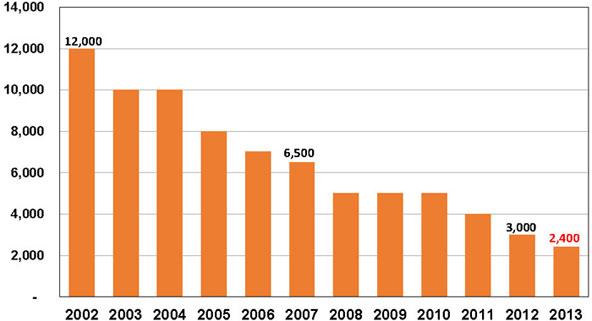
Article(s)
China’s “efforts to gradually reduce the application of the death penalty”
By Aurélie Plaçais, on 30 October 2014
Following a decision by the Communist Party’s Central Committee in November 2013 to “gradually reduce the number of crimes punishable by death”, a draft amendment to China’s criminal law was submitted for initial review to the country’s National People’s Congress this week.
2014
China
Article(s)
Geneva 2010: day 2 of intense working sessions
on 25 February 2010
National political leaders, activists, representatives of international organisations and many others have made it: a wide variety of abolitionist actors are now gathered in Geneva for the 4th World Congress Against the Death Penalty.
2010
Switzerland

Member(s)
Madrid Bar Association
on 5 May 2021
Founded in 1596, the Madrid Bar Association is made up of 77,000 lawyers, and its main mission is to defend their corporate interests and those of the citizens they serve. Likewise, the Bar guarantees its independence and the validity of the basic values of the profession, and provides its members with the services they need […]
2021
Spain
Document(s)
Facts and Figures 2009
By World Coalition against the death penalty , on 10 October 2009
2009
Campaigning
Trend Towards Abolition
frMore details Download [ pdf - 95 Ko ]
Facts and Figures 2009
- Document type Campaigning
- Themes list Trend Towards Abolition
- Available languages Faits et chiffres 2009
Page(s)
Podcasts recomendations
on 14 March 2023
Podcasts or series of podcasts by our members Broken Law Podcast Hosted by the staff of the American Constitution Society. Episode 23: How the World Views the Death Penalty Released on: Nov. 09, 2021 Listen to Podcast ADPAN Podcasts Series of podcasts hosted by The Anti-Death Penalty Asia Network Listen to Podcast Other podcasts to […]
2023

Article(s)
Critical expansion of the use of the death Penalty in India in 2018
By Project 39A, on 6 February 2019
In 2018 India followed a particularly repressive path by sentencing 162 people to death.
2019
India

Member(s)
Barreau de Paris
on 30 April 2020
The Paris Bar was founded under the reign of Louis XIV. Nowadays, it represents around 20 000 lawyers, i.e. nearly half of those practicing in France. Its prime objectives are to organise and structure the legal profession, to strengthen training and adapt it to the deep changes occurring in society and to expand the role […]
2020
France
Article(s)
Togo on the path to abolition
on 8 January 2009
While the World celebrated the 60th anniversary of the Universal Declaration of Human Rights the Togolese government decided to abolish the death penalty.
2009
Moratorium
Togo
Document(s)
Facts and Figures 2007
By World Coaliton against the death penalty , on 10 October 2009
2009
Campaigning
Trend Towards Abolition
frMore details Download [ pdf - 24 Ko ]
Facts and Figures 2007
- Document type Campaigning
- Themes list Trend Towards Abolition
- Available languages Faits et chiffres 2007
Article(s)
San Francisco hosts World Coalition AGM
on 31 May 2010
For the first time, a major international abolitionist event will take place on US soil on June 12 when World Coalition members converge on California for their general meeting and a public conference. Register now for access!
2010
United States
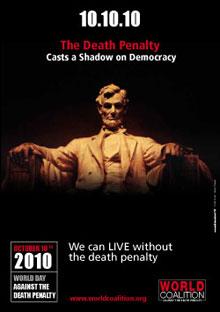
Article(s)
8th World Day Against the Death Penalty: USA
By Aurélie Plaçais, on 10 May 2010
On 10 October 2010, the 8th World Day Against the Death Penalty is dedicated to the USA which executed 52 people and handed down 106 death sentences in 2009.
2010
United States
Member(s)
Città di Venezia
on 30 April 2020
The city of Venice is globally renowned for its unique cultural heritage and location. Venice is strongly mobilised to improve the well-being of its inhabitants, by promoting a peaceful coexistence among its people and stimulating inter-religious and intercultural dialogue. In this way the city is following the example of tolerance set by the ancient “Serene […]
2020
Italy
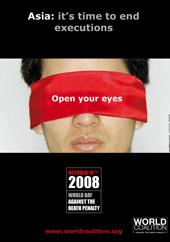
Article(s)
6th World Day Against the Death Penalty: open your eyes on Asia
By Aurélie Plaçais, on 4 August 2008
On 10 October 2008, World Day Against the Death Penalty, the World Coalition Against the Death Penalty calls on all citizens around the world to take action to end executions in Asia.
2008

Member(s)
Civil Rights and Social Justice Society (CRSJS)
on 30 April 2020
The Civil Rights and Social Justice Society (CRSJS) is a human rights NGO registered under the Travancore Cochin, Literary, Scientific and Charitable Societies Registration Act, 1955 in Kerala State, India in the year 1997. The members of CRSJS are persons committed to the promotion and protection of human rights in all spheres. However the main […]
2020
India
Document(s)
Anti–Death Penalty Advocacy: A Lawyer’s View from Australia
By Julian McMahon SC, on 1 September 2022
2022
Article
Australia
More details See the document
This article reviews the executions of Australians in the region and the Australian responses over the past two decades. Informed by the author’s legal defence role in death penalty cases in Singapore and Indonesia and other countries, the article explores developments in anti–death penalty advocacy since 2015: the parliamentary enquiry, the ‘whole of government’ strategy led by the Department of Foreign Affairs and Trade and the efforts made by Australia and Australians in Asia.
This article was first published in Crime Justice Journal: https://www.crimejusticejournal.com/issue/view/119
- Document type Article
- Countries list Australia
Page(s)
Support us
on 11 September 2020
Abolitionist countries and institutions Political support Join the “Friends of the Protocol” group and support our ratification campaign. Contribute to the World Day Against the Death Penalty on 10 October by mobilizing your diplomatic network in countries that still impose the death penalty. Financial support Make universal abolition of the death penalty a reality by […]
2020
Article(s)
10.10.10 World Day Against the Death Penalty – USA special
on 6 August 2010
On 10 October 2010, the World Day Against the Death Penalty will focus on the USA. There are two months left to prepare and promote the events planned around the world on the big day.
2010
Cruel, Inhuman and Degrading Treatment and Punishment
United States

Member(s)
People of Faith Against the Death Penalty
on 30 April 2020
People of Faith Against the Death Penalty (PFADP) is a nongovernmental organisation whose mission is to educate and mobilise faith communities to act to abolish the death penalty in the United States. Founded in 1994 in North Carolina, PFADP focuses its programs on organising among faith communities in the Southern United States, where most executions […]
2020
United States

Member(s)
The Advocates for Human Rights
on 30 April 2020
The mission of The Advocates for Human Rights is to implement international human rights standards in order to promote civil society and reinforce the rule of law. By involving volunteers in research, education, and advocacy, The Advocates build broad constituencies in the United States and select global communities. In 1991, The Advocates adopted a formal […]
United States
Article(s)
MEPs call on Guatemala not to reinstate capital punishment
on 25 February 2008
Members of the European Parliament Hélène Flautre and Raimon Obiols have called on Guatemala to maintain its moratorium on the death penalty after the Central American country passed dangerous legislation.
2008
Clemency
Guatemala
Moratorium

Article(s)
7th World Congress – Closing ceremony
By World coaltion against death penalty, on 1 March 2019
The 7th World Congress is coming to an end, after four days of intense exchanges and debates to advance the cause of abolition. A look back at this last morning and the closing ceremony.
2019
Public Opinion
Article(s)
International pressure on Iraq to stop executions
on 18 February 2010
Several UN member states taking part in Iraq’s UN human rights review have asked Bagdad to restore a moratorium on the use of the death penalty and to move towards abolition.
2010
France
Iraq
Iraq
Italy
Terrorism
United Kingdom

Member(s)
Ville de Braine-l’Alleud
on 30 April 2020
The town of Brain-l’Alleud is located in Brabant wallon in the Hain valley, about twenty kilometres from Brussels. It has 37,000 inhabitants. Previously the site of the Battle of Waterloo in 1815, today the town welcomes much more peaceful activities, including a large number of NGOS and in particular an Amnesty International group and the […]
2020
Belgium

Member(s)
International Association of Lawyers
on 30 April 2020
Established in 1927, and with members in 110 countries, the UIA (International Association of Lawyers) is a global and multi-cultural organization for the legal profession that facilitates professional development, stimulates learning and networking, and promotes the Rule of Law. UIA is open to all the world’s lawyers, both general practitioners and specialists. The UIA’s members […]
France
Article(s)
Register now for the 4th World Congress
on 5 November 2009
The largest global abolitionist event will take place in Geneva next February. Participants are invited to register as soon as possible.
2009
Switzerland
Document(s)
21st World Day – Facts and Figures 2023
By the World Coalition Against the Death Penalty, on 12 June 2023
2023
Campaigning
World Coalition
frMore details Download [ pdf - 239 Ko ]
Find the main facts and figures regarding the death penalty worldwide in 2022 and early 2023.
- Document type Campaigning / World Coalition
- Available languages 21ème Journée Mondiale - Faits et chiffres 2023
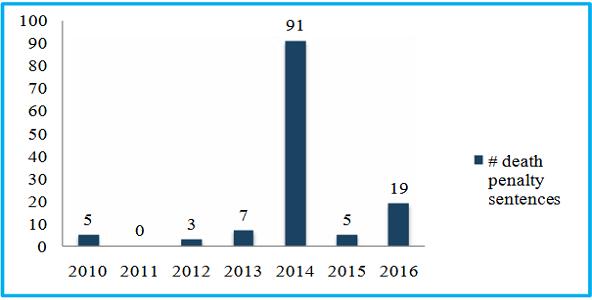
Article(s)
“Unknown Assailants: A Threat to Human Rights”
By Legal Human Rights Centre, on 4 May 2018
So is named The Tanzania Human Rights Report of 2017 released by the Legal and Human Rights Centre (LHRC).This report was published on April 25th, 2018 and it enlights for the fifteenth time the major human rights violations in Tanzania. This report, while it deals with human rights violation in Tanzania concerning civil and politial rights, freedom of violence, freedom of expression, also presents the death penalty as an issue in the coutnry and called the President for its abolition.
2018
Cruel, Inhuman and Degrading Treatment and Punishment
United Republic of Tanzania
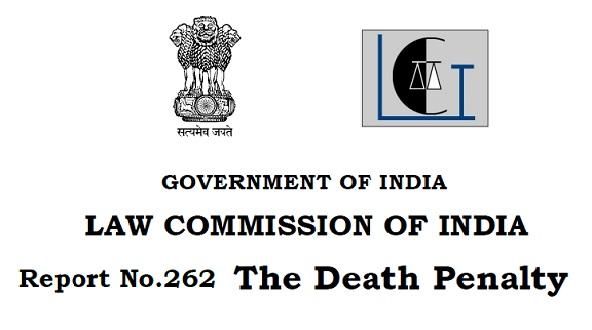
Article(s)
The Law Commission of India (Almost) calls for Abolition
By Elisa Belotti, on 15 September 2015
The Law Commission of India published in August 2015 a Report on death penalty in which it recommends India to move towards the abolition of death penalty, with an exception for terrorism related crimes.
2015
India
Page(s)
The Death Penalty Worldwide
on 22 June 2020
Navigate the list of countries below to get country-by-country information on the laws and practices associated with the use of the death penalty. This information is taken from the Death Penalty Worldwide database, which also offers an advanced search function (capital crimes, prison conditions, appeal procedures, legal representation…) in English and in French. Database execution figures are sourced […]
2020
Member(s)
Forum Marocain pour la Vérité et la Justice
on 30 April 2020
Le Forum marocain pour la vérité et la justice (FMVJ) was created by victims of the “years of lead” between 1956 and 1999. It defines itself as a human rights association dedicated to defending the rights of victims of forced disappearances, arbitrary detention, torture and exile, and their families. The FMVJ seeks to establish the […]
2020
Morocco
Document(s)
Death Penalty and the Indian Supreme Court (2007-2021)
By Project 39A, on 8 December 2022
2022
NGO report
India
More details See the document
Death Penalty and the Indian Supreme Court (2007-2021) maps the important trends and developments in the Supreme Court’s death penalty jurisprudence. These past 15 years have witnessed significant developments in the law on capital sentencing, post-mercy jurisprudence, and other procedural developments pertaining to the administration of the death penalty. Imagined as an intellectual successor of PUCL and Amnesty International’s doctrinal study of the Supreme Court’s death penalty cases between 1950 to 2006, in ‘Lethal Lottery: The Death Penalty in India’, this report highlights the sustained inconsistency and judge-centric reasoning in capital cases, with particular emphasis on the problem of arbitrariness in approaches to capital sentencing at the Supreme Court.
- Document type NGO report
- Countries list India
Article(s)
US abolitionists are training for the long run
on 24 January 2010
The Annual Conference of the US National Coalition to Abolish the Death Penalty gathered more than 400 abolitionists from around the country around the theme: Training for the long run.”
2010
United States

Article(s)
Zambia is the 25th African State to Abolish the Death Penalty
By Bronwyn Dudley, World Coalition Against the Death Penalty, on 6 January 2023
On 23 December 2022, Zambian President Hakainde Hichilema signed into law Penal Code (Amendment) Bill number 25, which bans the death penalty and the offence of criminal defamation of the president.
2023
Zambia
Member(s)
Legal Awareness Watch (LAW)
on 30 April 2020
Legal Awareness Watch (LAW) is a nonpartisan, non-profitable NGO registered under law since 1999, holding registration number 1388. Since its creation, LAW has been advocating, and raising awareness in Pakistan on human rights of prisoners in 104 Pakistani prisons i.e. the right to vote, right to dignity, right to life etc. Apart from the promotion […]
2020
Pakistan
Document(s)
Death sentences and executions 2020
By Amnesty International , on 26 May 2021
2021
NGO report
aresfafrruMore details See the document
This report covers the judicial use of the death penalty for the period January to December 2020. As in previous years, information is collected from a variety of sources, including:
– official figures;
– judgements;
– information from individuals sentenced to death and their families and representatives;
– media reports;
– and, for a limited number of countries, other civil society organizations.
Amnesty International reports only on executions, death sentences and other aspects of the use of the death penalty, , such as commutations and exonerations, where there is reasonable confirmation. In many countries governments do not publish information on their use of the death penalty. In China and Viet Nam, data on the use of the death penalty is classified as a state secret. During 2020 little or no information was available on some countries – in particular Laos and North Korea (Democratic People’s Republic of Korea) – due to restrictive state practice.
- Document type NGO report
- Available languages أحكام وعمليات اإلعدام في2020CONDENAS A MUERTE Y EJECUCIONES 2020احکام مرگ و اعدامها۲۰۲۰سالCondamnations à mort et exécutions 2020ГЛОБАЛЬНЫЙ ДОКЛАД СМЕРТНЫЕ ПРИГОВОРЫ И КАЗНИ 2020
Document(s)
Annual Report on the Death Penalty in Iran 2022
By Iran Human Rights & ECPM, on 13 April 2023
2023
NGO report
Iran (Islamic Republic of)
frMore details See the document
The 15th Annual Report on the Death Penalty in Iran, by Iran Human Rights and ECPM reveals the highest annual number of executions since 2015. At least 582 people were executed, an increase of 75% compared to 2021. In 2022, Iran’s authorities demonstrated how crucial the death penalty is to instil societal fear in order to hold onto power.
- Document type NGO report
- Countries list Iran (Islamic Republic of)
- Available languages Rapport annuel sur la peine de mort en Iran 2022
Document(s)
Joint letter with the Inter-American Commission on Human Rights on the occasion of the 30th anniversary of the Protocol to the American Convention on Human Rights to abolish the death penalty
on 1 January 2020
2020
NGO report
Regional body report
esfrMore details Download [ pdf - 105 Ko ]
- Document type NGO report / Regional body report
- Available languages Carta conjunta con la Comisión Interamericana de Derechos Humanos sobre el 30º aniversario del Protocolo a la Convención Americana sobre Derechos Humanos sobre la Abolición de la Pena de MuerteLettre conjointe avec la Commission interaméricaine des droits de l'homme à l'occasion du 30ème anniversaire du Protocole à la Convention américaine relative aux droits de l'homme traitant de l'abolition de la peine de mort

Member(s)
International Bar Association’s Human Rights Institute (IBAHRI)
on 14 March 2023
The International Bar Association’s Human Rights Institute (IBAHRI) works with the global legal community to promote and protect human rights and the independence of the legal profession worldwide. The IBAHRI is an autonomous and substantively independent entity of the International Bar Association (IBA), the world’s leading organisation of international legal practitioners, bar associations and law […]
2023
United Kingdom
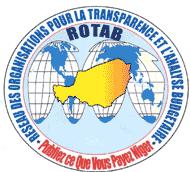
Member(s)
ROTAB
on 30 April 2020
The Organisation for Transparency and Budgetary Analysis (ROTAB – Publish What You Pay Niger) is a group of several associations, NGOs and unions in Niger who decided to take part in the worldwide campaign Publish What You Pay. This initiative calls for transparency in the extraction industry, at a time when the murky nature of […]
2020
Niger
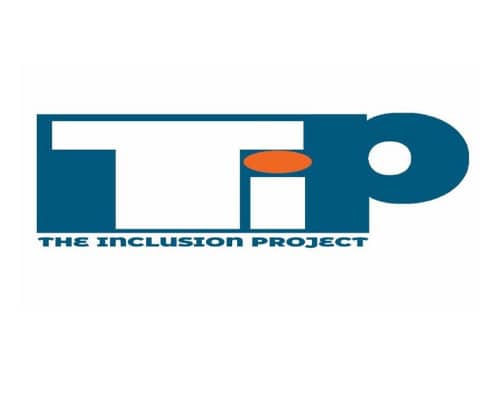
Member(s)
The Inclusion Project
on 13 September 2024
The Inclusion Project (TIP) is a legal services provider founded in 2019 and registered in Nigeria as The Inclusion Project.
2024
Nigeria
Article(s)
Anti-death penalty double bill in the Gaza Strip
on 3 April 2008
The Palestinian Centre for Human Rights (PCHR), a Gaza-based NGO and a member of the World Coalition, organised two meetings on the death penalty in March.
2008
Public Opinion
State of Palestine
Article(s)
“We are the future” – Kids Against the Death Penalty
on 28 February 2010
The teenage nephews of an American death row inmate started an anti-death penalty organization that has grown into a pillar of the Texas abolitionist community.
2010
Innocence
Switzerland
United States
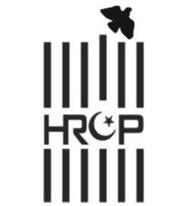
Member(s)
Human Rights Commission of Pakistan
on 30 April 2020
Founded in 1986 and registered in 1987, the Human Rights Commission of Pakistan (HRCP) is an independent, democratic, nonpartisan organization committed to supporting human rights in the country. Over the last three decades, HRCP has worked for women’s empowerment and gender equality, the rights of religious minorities, rule of law and access to justice, democratic […]
2020
Pakistan
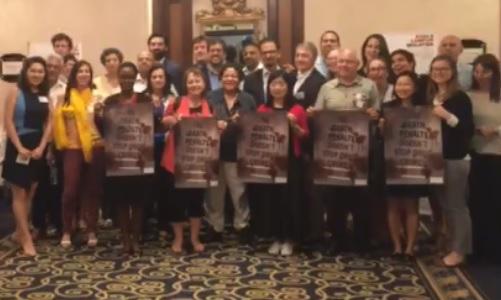
Article(s)
World Coalition elects new decision-making bodies
By World Coalition Against the Death Penalty, on 22 June 2015
The World Coalition Against the Death Penalty has elected a new Steering Committee and a new Executive Board to serve for two years.
2015
Article(s)
Victims of crime oppose the death penalty
on 26 February 2010
Parents and friends of those killed fill a growing space in the debate on the death penalty and, increasingly, this is to call for abolition rather than vengeance.
2010
Murder Victims' Families
Article(s)
Every voice counts to oppose the death penalty in California
on 24 June 2009
Abolitionists are given a unique opportunity to voice their position as Californian authorities seek comments from the public on the review of the lethal injection process.
2009
Cruel, Inhuman and Degrading Treatment and Punishment
United States
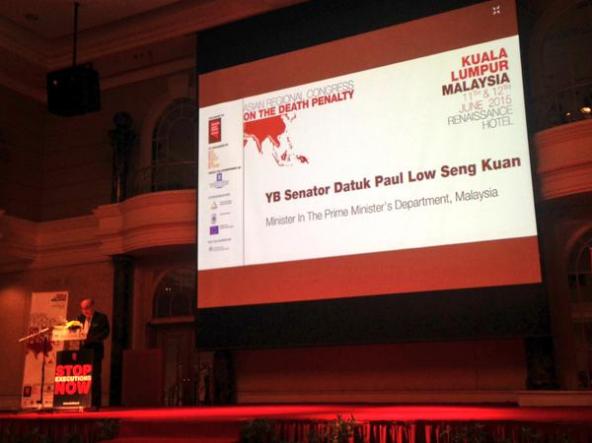
Article(s)
Regional Congress against the Death Penalty Live!
By World Coalition Against the Death Penalty, on 12 June 2015
Follow the Asia Regional Congress against the Death Penalty organised by ECPM in partnership with ADPAN on 11-12 June 2015 in Kuala Lumpur, Malaysia
2015
Malaysia

Member(s)
The American Constitution Society (ACS)
on 5 September 2022
The American Constitution Society (ACS) is a United States-based network of progressive lawyers, law students, judges, policymakers, legislators, and academics dedicated to realizing the promises of the U.S. Constitution by advancing and defending democracy, justice, equality, and liberty; securing a government that serves the public interest; and guarding against the abuse of law and the […]
2022
United States

Article(s)
Washington State Abolishes Death Penalty
By Nicolas Chua, on 26 October 2018
On 11 October 2018, Washington became the 20th US state to abolish the death penalty: the court ruling, written by Chief Justice Mary E. Fairhurst, cited the “arbitrary and racially biased manner” in which the death penalty was applied as a violation of the state’s constitutional prohibition of “cruel punishment”.
2018
United States
Article(s)
Clever use of online tools could boost activism
on 28 February 2010
Kathy Brown, an English IT specialist, is not the typical anti-death penalty campaigner. She is not an NGO-registered lawyer nor a political science student. But through the internet, she has become active in the global abolitionist community.
2010
China
Drug Offenses
Mental Illness

Article(s)
Papua New Guinea: one step away from full abolition of the death penalty
By Aurélie Plaçais, World Coalition Against the Death Penalty, on 21 January 2022
Papua New Guinea’s National Parliament voted to repeal the death penalty on 20 January2022. The bill has now to be signed into law and to be published in the official gazette.
2022
Moratorium
Papua New Guinea
Document(s)
Note verbale dated 11 March 2011 from the Permanent Mission of Egypt to the United Nations addressed to the Secretary-General
By United Nations, on 8 September 2020
2020
United Nations report
Afghanistan
Antigua and Barbuda
Bahamas
Bahrain
Bangladesh
Barbados
Botswana
Brunei Darussalam
Central African Republic
Chad
China
Democratic People's Republic of Korea
Democratic Republic of the Congo
Dominica
Egypt
Equatorial Guinea
Eritrea
Eswatini
Ethiopia
Grenada
Guinea
Guyana
Indonesia
Iran (Islamic Republic of)
Iraq
Jamaica
Kuwait
Lao People's Democratic Republic
Libya
Malaysia
Moratorium
Myanmar
Niger
Nigeria
Oman
Pakistan
Papua New Guinea
Qatar
Saint Kitts and Nevis
Saint Lucia
Saint Vincent and the Grenadines
Saudi Arabia
Sierra Leone
Singapore
Solomon Islands
Somalia
Sudan
Syrian Arab Republic
Tonga
Trinidad and Tobago
Uganda
United Arab Emirates
Yemen
Zimbabwe
aresfrruzh-hantMore details See the document
The permanent missions to the United Nations in New York listed below have the honour to refer to General Assembly resolution 65/206, entitled “Moratorium on the use of the death penalty”, which was adopted by the Third Committee on 11 November 2010, and subsequently by the General Assembly on 21 December 2010 by a recorded vote. The permanent missions wish to place on record that they are in persistent objection to any attempt to impose a moratorium on the use of the death penalty or its abolition in contravention of existing stipulations under international law, for the following reasons:
- Document type United Nations report
- Countries list Afghanistan / Antigua and Barbuda / Bahamas / Bahrain / Bangladesh / Barbados / Botswana / Brunei Darussalam / Central African Republic / Chad / China / Democratic People's Republic of Korea / Democratic Republic of the Congo / Dominica / Egypt / Equatorial Guinea / Eritrea / Eswatini / Ethiopia / Grenada / Guinea / Guyana / Indonesia / Iran (Islamic Republic of) / Iraq / Jamaica / Kuwait / Lao People's Democratic Republic / Libya / Malaysia / Myanmar / Niger / Nigeria / Oman / Pakistan / Papua New Guinea / Qatar / Saint Kitts and Nevis / Saint Lucia / Saint Vincent and the Grenadines / Saudi Arabia / Sierra Leone / Singapore / Solomon Islands / Somalia / Sudan / Syrian Arab Republic / Tonga / Trinidad and Tobago / Uganda / United Arab Emirates / Yemen / Zimbabwe
- Themes list Moratorium
- Available languages مذكرة شفوية مؤرخة 11 آذار/مارس 2011 موجَّهة إلى الأمين العام من البعثة الدائمة لمصر لدى الأمم المتحدةNota verbal de fecha 11 de marzo de 2011 dirigida al Secretario General por la Misión Permanente de Egipto ante las Naciones UnidasNote verbale datée du 11 mars 2011, adressée au Secrétaire général par la Mission permanente de l’Égypte auprès de l’Organisation des Nations UniesВербальная нота Постоянного представительства Египта при Организации Объединенных Наций от 11 марта 2011 года на имя Генерального секретаря2011年3月11日埃及常驻联合国代表团给秘书长的普通照会

Member(s)
Foundation for Human Rights Initiative (FHRI)
on 30 April 2020
The Foundation for Human Rights Initiative (FHRI) is an independent, non-governmental organisation aiming to enhance the knowledge, respect and observance of human rights in Uganda. FHRI’s objective is to remove obstacles to democratic development. The organisation defends the fundamental freedoms enshrined in the 1995 Ugandan Constitution and other internationally recognised human rights instruments. FHRI undertakes […]
2020
Uganda
Article(s)
Four Japanese executed in China
on 9 April 2010
A Japanese abolitionist organisation has criticised both the Chinese and the Japanese authorities after the series of executions.
2010
China
Drug Offenses
Member(s)
European Association for Human Rights
on 30 April 2020
The European Association for Human Rights mainly promotes the welfare of prisoners. Its work is especially focused on taking care for death row prisoners and their children, and abolishing the death penalty. Many people on death row are dismissed in their search for help and support from the established human rights organizations. There is a […]
2020
France

Member(s)
Parliamentarians for Global Action (PGA)
on 30 April 2020
Parliamentarians for Global Action (PGA), a non-profit, non-partisan international network of over 1,200 legislators in approximately 130 elected parliaments around the globe, aims to promote peace, democracy, the rule of law, human rights, gender equality and population issues by informing, convening, and mobilizing parliamentarians to realize these goals. The network of legislators’ programme of work […]
United States

Member(s)
ACAT France
on 30 April 2020
ACAT-France – Action by Christians for the Abolition of Torture – is a human rights NGO that campaigns for the abolition of torture and the death penalty, and defends the right to asylum. Founded in 1974, ACAT-France has 28,000 members, including nearly 6,000 supporters and a team of 25 professionals working in its national secretariat. […]
France
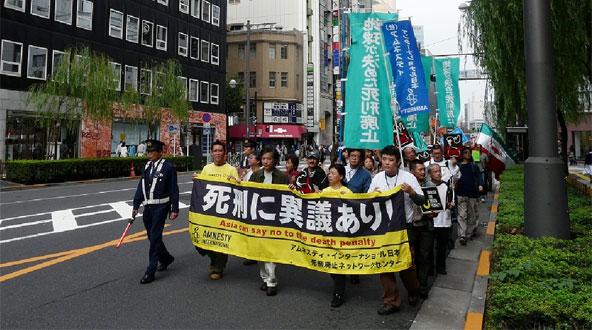
Article(s)
Japan death penalty at turning point
on 9 February 2012
After one year without executions, the Japanese government looks set to resume state killings. The Center for Prisoners’ Rights, a World Coalition member organisation, has launched an urgent petition to reverse the trend.
2012
Clemency
Japan
Article(s)
Iran: Human rights and anti-death penalty activist Emmadeddin Baghi arrested
on 16 October 2007
The World Coalition Against the Death Penalty (WCADP) is greatly concerned with the arrest and imprisonment, on 14 October, of Iranian abolitionist Emmadeddin Baghi.
2007
Iran (Islamic Republic of)
Legal Representation
Document(s)
Keep the Death Penalty Abolished in the Philippines (Pangasinense)
By World Coalition Against Death Penalty, on 23 March 2021
2021
Campaigning
Drug Offenses
Philippines
More details Download [ pdf - 1042 Ko ]
This brochure was developed by the World Coalition Against the Death Penalty with the Commission on the Human Rights in the Philippines. It explains why the death penalty risks returning in the Philippines and the reasons against its resurgence. It is available in 11 languages of the Philippines, plus French and English.
- Document type Campaigning
- Countries list Philippines
- Themes list Drug Offenses
Document(s)
Keep the Death Penalty Abolished in the Philippines (Marano)
By World Coalition Against Death Penalty, on 23 March 2021
Campaigning
Drug Offenses
Philippines
More details Download [ pdf - 1410 Ko ]
This brochure was developed by the World Coalition Against the Death Penalty with the Commission on the Human Rights in the Philippines. It explains why the death penalty risks returning in the Philippines and the reasons against its resurgence. It is available in 11 languages of the Philippines, plus French and English.
- Document type Campaigning
- Countries list Philippines
- Themes list Drug Offenses
Document(s)
Keep the Death Penalty Abolished in the Philippines (Kapampangan)
By World Coalition Against Death Penalty, on 23 March 2021
Campaigning
Drug Offenses
Philippines
More details Download [ pdf - 731 Ko ]
This brochure was developed by the World Coalition Against the Death Penalty with the Commission on the Human Rights in the Philippines. It explains why the death penalty risks returning in the Philippines and the reasons against its resurgence. It is available in 11 languages of the Philippines, plus French and English.
- Document type Campaigning
- Countries list Philippines
- Themes list Drug Offenses
Document(s)
Keep the Death Penalty Abolished in the Philippines (Bicolano)
By World Coalition Against Death Penalty, on 23 March 2021
Campaigning
Drug Offenses
Philippines
More details Download [ pdf - 2584 Ko ]
This brochure was developed by the World Coalition Against the Death Penalty with the Commission on the Human Rights in the Philippines. It explains why the death penalty risks returning in the Philippines and the reasons against its resurgence. It is available in 11 languages of the Philippines, plus French and English.
- Document type Campaigning
- Countries list Philippines
- Themes list Drug Offenses
Document(s)
Keep the Death Penalty Abolished in the Philippines (Cebuano)
By World Coalition Against Death Penalty, on 23 March 2021
Campaigning
Drug Offenses
Philippines
More details Download [ pdf - 2567 Ko ]
This brochure was developed by the World Coalition Against the Death Penalty with the Commission on the Human Rights in the Philippines. It explains why the death penalty risks returning in the Philippines and the reasons against its resurgence. It is available in 11 languages of the Philippines, plus French and English.
- Document type Campaigning
- Countries list Philippines
- Themes list Drug Offenses
Document(s)
Keep the Death Penalty Abolished in the Philippines (Waray)
By World Coalition Against Death Penalty, on 23 March 2021
Campaigning
Drug Offenses
Philippines
More details Download [ pdf - 1057 Ko ]
This brochure was developed by the World Coalition Against the Death Penalty with the Commission on the Human Rights in the Philippines. It explains why the death penalty risks returning in the Philippines and the reasons against its resurgence. It is available in 11 languages of the Philippines, plus French and English.
- Document type Campaigning
- Countries list Philippines
- Themes list Drug Offenses
Document(s)
Keep the Death Penalty Abolished in the Philippines (English)
By World Coalition Against Death Penalty, on 23 March 2021
Campaigning
Drug Offenses
Philippines
frMore details Download [ pdf - 7827 Ko ]
This brochure was developed by the World Coalition Against the Death Penalty with the Commission on the Human Rights in the Philippines. It explains why the death penalty risks returning in the Philippines and the reasons against its resurgence. It is available in 11 languages of the Philippines, plus French and English.
- Document type Campaigning
- Countries list Philippines
- Themes list Drug Offenses
- Available languages Maintenir l'abolition de la peine de mort aux Philippines (Français)
Document(s)
Keep the Death Penalty Abolished in the Philippines (Hiligaynon)
By World Coalition Against Death Penalty, on 23 March 2021
Campaigning
Drug Offenses
Philippines
More details Download [ pdf - 2538 Ko ]
This brochure was developed by the World Coalition Against the Death Penalty with the Commission on the Human Rights in the Philippines. It explains why the death penalty risks returning in the Philippines and the reasons against its resurgence. It is available in 11 languages of the Philippines, plus French and English.
- Document type Campaigning
- Countries list Philippines
- Themes list Drug Offenses
Document(s)
Keep the Death Penalty Abolished in the Philippines (Ilokano)
By World Coalition Against Death Penalty, on 23 March 2021
Campaigning
Drug Offenses
Philippines
More details Download [ pdf - 2550 Ko ]
This brochure was developed by the World Coalition Against the Death Penalty with the Commission on the Human Rights in the Philippines. It explains why the death penalty risks returning in the Philippines and the reasons against its resurgence. It is available in 11 languages of the Philippines, plus French and English.
- Document type Campaigning
- Countries list Philippines
- Themes list Drug Offenses
Document(s)
Keep the Death Penalty Abolished in the Philippines (Tausug)
By World Coalition Against Death Penalty, on 23 March 2021
Campaigning
Drug Offenses
Philippines
More details Download [ pdf - 2595 Ko ]
This brochure was developed by the World Coalition Against the Death Penalty with the Commission on the Human Rights in the Philippines. It explains why the death penalty risks returning in the Philippines and the reasons against its resurgence. It is available in 11 languages of the Philippines, plus French and English.
- Document type Campaigning
- Countries list Philippines
- Themes list Drug Offenses
Document(s)
Keep the Death Penalty Abolished in the Philippines (Tagalog)
By World Coalition Against Death Penalty, on 23 March 2021
Campaigning
Drug Offenses
Philippines
More details Download [ pdf - 2519 Ko ]
This brochure was developed by the World Coalition Against the Death Penalty with the Commission on the Human Rights in the Philippines. It explains why the death penalty risks returning in the Philippines and the reasons against its resurgence. It is available in 11 languages of the Philippines, plus French and English.
- Document type Campaigning
- Countries list Philippines
- Themes list Drug Offenses
Document(s)
Issues Impacting LGBTQ+ Prisoners
By Death Penalty Information Center, on 3 September 2024
2024
NGO report
Cruel, Inhuman and Degrading Treatment and Punishment
Fair Trial
United States
More details See the document
LGBTQ+ people, especially people of color and low income, experience high levels of policing and criminalization, leading to an overrepresentation of these individuals in the incarcerated population. A 2017 study from researchers at the University of California, Los Angeles School of Law, suggests that LGBTQ+ people are three times as likely to be incarcerated than the general population. Once incarcerated, LGBTQ+ people are often subjected to violence from correctional staff and fellow prisoners, as well denied medical care and access to mental health services.
- Document type NGO report
- Countries list United States
- Themes list Cruel, Inhuman and Degrading Treatment and Punishment / Fair Trial
Document(s)
The Death Penalty In Egypt: Theoretical and Practical Study in the Light of Islamic Shariah and International Human Rights Law
By Dr. Mohamed Al Ghamry / Arab Penal Reform Organization APRO, on 1 January 2008
2008
NGO report
arMore details See the document
This study addresses the subject of the “death Penalty in Egypt”, which is an applied theoretical study done in light of the principles of the Islamic law and provisions concerning international human rights law. Egyptian Penal Code No. 58/1937 is the modern penal code that still retains the death penalty in spite of its cruelty and strictness and impossibility of reforming its results or amending them. The laws governing the death penalty in Egypt are considered one of the most deterrent penalties at all levels, general and private, that ensures combating crimes and preserving the interests of society, as well as ensuring stability in spite of the presence of an increasing international inclination led by the United Nations and some international NGOs headed by Amnesty International to abolish the Death Penalty given the difficulty to reconcile between this penalty and obligation to respecting human rights.There is no doubt that the intention to study the legislative system of the death penalty in Egypt, with the purpose of the determination of legality of this penalty and the demonstration of the feasibility of its application for society, is difficult without identifying all the roles and functions caused by the death penalty over successive legal ages in Egypt. When the criminal legislator passes new laws that address crimes in Egypt, in his appreciation, to achieve deterrence and for the purpose of combating crime, the legislator does nothing new in society. The work of the legislature work is a product of an interaction between the proposed legislative articles to solve the realistic problems from which society suffers in a historical moment on the one hand, and the cultural, social, religious, legal and political heritage coming to our society from abroad, may play a key role in the determination of the content of the proposed legislative text in the context of the mutual influence between cultures. In this context, this study begins by an introductory chapter entitled “The Historical Origins of the Death Penalty in Egypt” in which we tried to pin the Egyptian penal legislation to its origin by studying the position of death penalty and its evolution in society. By identifying the historical origin of the Death Penalty in Egypt, we then present an objective view on the future of death penalty in Egypt between retention and abolition. —- Please find document at bottom of web page.
- Document type NGO report
- Themes list Religion ,
- Available languages عقوبة الإعدام في مصر دراسة نظرية وتطبيقية في ضوء مبادئ الشريعة الإسلامية وأحكام القانون الدولي لحقوق الإنسان
Document(s)
The death penalty in the Arab world: Study on the death penalty in some Arab countries
By Arab Penal Reform Organization APRO, on 1 January 2007
2007
NGO report
arMore details See the document
The essence of the death penalty is the eradication of life for the condemned. Death penalty was a common practice in ancient heavenly religions, especially in times dominated by the idea of religious revenge. Additionally, it was implemented in a brutal and cruel way accompanied by terrible methods of torture. The death penalty has not been controversial in the old legislation; it has been recognized by scholars without attempting to justify it, as governors and legislators apply it without resistance from thinkers and philosophers. In the modern era, controversy has arisen about the feasibility and legality of the death penalty as a form of social reaction to the offender. The eighteenth century is marked by philosophical ideas which attacked the prevailing penal systems, as studies and research have appeared on the social and anthropological causes of crime. Thus, two intellectual trends have appeared on the horizon: those in favor of retaining the death penalty, and those demanding its abolishment. Each trend has its reasons and pretexts supporting their thoughts concerning the death penalty. Hence, the study analyses and examines “The Death Penalty in the Arab World” through a series of distinctive research methods, addressing the death penalty in ten Arab countries. The following is presented according to a signal research plan that includes: crimes punishable by death, and procedural guarantees on the death penalty and its adequacy, as well as putting forward many proposals and recommendations on the abolishment of the death penalty. This study includes the death penalty in ten Arab countries: Bahrain – Egypt – Jordan – Iraq – Lebanon- Morocco- Palestine – Saudi Arabia – Syria- Yemen. —- Go to first document in English.
- Document type NGO report
- Available languages عقوبة الإعدام فى الوطن العربى: دراسة حول عقوبة الإعدام فى بعض الدول العربية
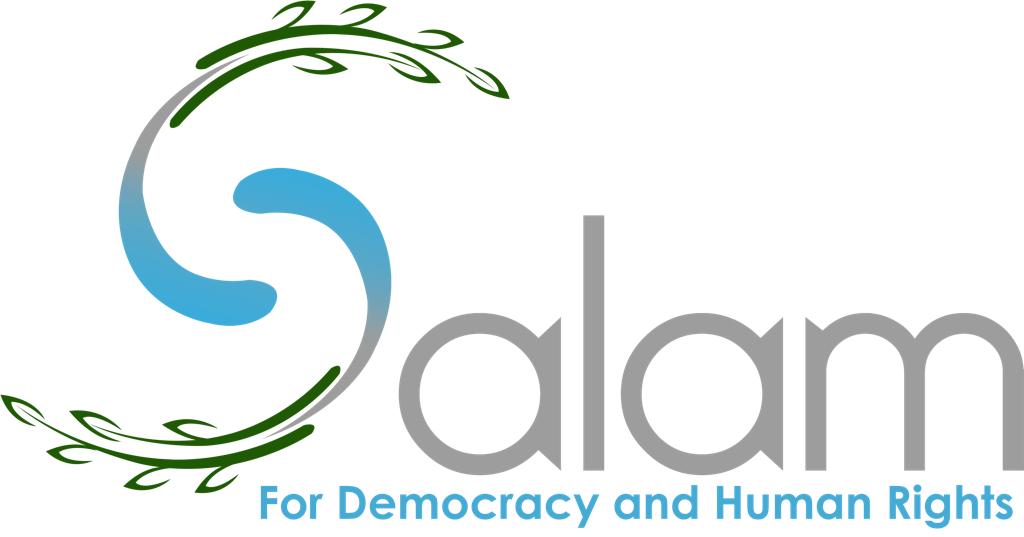
Member(s)
SALAM for Democracy and Human Rights (SALAM DHR)
on 30 April 2021
SALAM for Democracy and Human Rights (SALAM DHR) is an NGO that endeavors to preserve universal principles of dignity and respect by shielding democracy and human rights. SALAM DHR conducts monitoring and analysis, produces reports, develops recommendations on policy and legislation, organizes advocacy campaigns, conducts trainings, and builds effective coalitions. SALAM DHR is actively involved […]
2021
Bahrain
Article(s)
Take collective action: join the World Coalition
on 1 May 2007
Since 2002 about sixty non-governmental organisations, professional associations and public bodies working throughout the world in support of abolition of the death penalty have come together through the World Coalition Against the Death Penalty.
2007
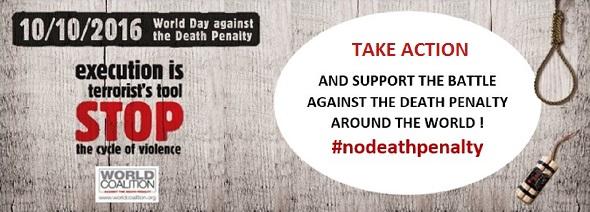
Article(s)
Take Action for World Day 2016!
By World Coalition Against the Death Penalty, on 3 October 2016
Check what you can do for 10 October. Browse the calendar of events and the map to prepare and promote the events planned around the world on the big day.
2016
Terrorism
Document(s)
Capital punishment and implementation of the safeguards guaranteeing protection of the rights of those facing the death penalty: Report of the Secretary-General
By United Nations, on 1 January 2005
2005
United Nations report
arruesfrzh-hantMore details See the document
The present report, prepared pursuant to Economic and Social Council resolutions 1754 (LIV) of 16 May 1973 and 1995/57 of 28 July 1995, and Council decision 2005/247 of 22 July 2005, is the eighth quinquennial report of the Secretary-General on capital punishment. It covers the period 2004-2008 and reviews developments in the use of capital punishment. The report confirms a very marked trend towards abolition and restriction of the use of capital punishment in most countries. The rate at which States that retained the death penalty at the start of the quinquennium have abolished its use either in law or in practice is comparable with that of previous reporting periods, and may even be accelerating slightly. Moreover, countries that retain the death penalty are, with rare exceptions, significantly reducing its use in terms of numbers of persons executed and the crimes for which it may be imposed. Nevertheless, where capital punishment remains in force, there are serious problems with regard to the respect of international norms and standards, notably in the limitation of the death penalty to the most serious crimes, the exclusion of juvenile offenders from its scope, and guarantees of a fair trial.
- Document type United Nations report
- Themes list Trend Towards Abolition,
- Available languages عقوبة الإعدام وتنفيذ الضمانات التي تكفل حماية حقوق الذين يواجهون عقوبة الإعدام : م ذكّرة من الأمين العامСмертная казнь и применение мер, гарантирующих защиту прав тех, кому грозит смертная казнь : Доклад Генерального секретаряLa pena capital y la aplicación de las salvaguardias para garantizar la protección de los derechos de los condenados a la pena de muerte : Informe del Secretario GeneralPeine capitale et application des garanties pour la protection des droits des personnes passibles de la peine de mort: Rapport du Secrétaire général死刑和保护死刑犯权利的保障措施的执行情况: 秘书长的报告
Document(s)
Capital punishment and the implementation of the safeguards guaranteeing protection of the rights of those facing the death penalty – Yearly supplement of the Secretary-General to his quinquennial report
By United Nations / Human Rights Council, on 8 September 2020
2020
United Nations report
rufrzh-hantesMore details See the document
The Report examines the possible consequences of the imposition and application of the death penalty on the enjoyment of various human rights, including human dignity, the right to life, the right to freedom from torture or other cruel, inhuman or degrading treatment or punishment, the right to a fair trial and the right to equality and non-discrimination. It further examines the human rights consequences of the lack of transparency in the imposition and application of the death penalty.
- Document type United Nations report
- Themes list Fair Trial, Right to life, Cruel, Inhuman and Degrading Treatment and Punishment,
- Available languages Смертная казнь и осуществление мер, гарантирующих защиту прав лиц, приговоренных к смертной казни. Ежегодное дополнение Генерального секретаря к его пятилетнему докладу по вопросу о смертной казниPeine capitale et application des garanties pour la protection des droits des personnes passibles de la peine de mort. Supplément annuel au rapport quinquennal du Secrétaire général sur la peine capitale死刑和保护死刑犯权利的保障措施的执行情况 秘书长关于死刑问题的五年一度报告的年度补编La pena capital y la aplicación de las salvaguardias para garantizar la protección de los derechos de los condenados a la pena de muerte. Suplemento anual del Secretario General de su informe quinquenal sobre la pena capital
Document(s)
From Lynch Mobs to the Killing State : Race and the Death Penalty in America
By Austin Sarat and Charles J. Ogletree, Jr., on 24 August 2023
2023
Book
United States
More details See the document
Since 1976, over forty percent of prisoners executed in American jails have been African American or Hispanic. This trend shows little evidence of diminishing, and follows a larger pattern of the violent criminalization of African American populations that has marked the country’s history of punishment.
In a bold attempt to tackle the looming question of how and why the connection between race and the death penalty has been so strong throughout American history, Ogletree and Sarat headline an interdisciplinary cast of experts in reflecting on this disturbing issue. Insightful original essays approach the topic from legal, historical, cultural, and social science perspectives to show the ways that the death penalty is racialized, the places in the death penalty process where race makes a difference, and the ways that meanings of race in the United States are constructed in and through our practices of capital punishment.
From Lynch Mobs to the Killing State not only uncovers the ways that race influences capital punishment, but also attempts to situate the linkage between race and the death penalty in the history of this country, in particular the history of lynching. In its probing examination of how and why the connection between race and the death penalty has been so strong throughout American history, this book forces us to consider how the death penalty gives meaning to race as well as why the racialization of the death penalty is uniquely American.
- Document type Book
- Countries list United States
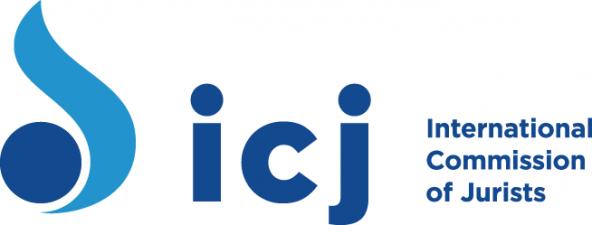
Member(s)
International Commission of Jurists
on 30 April 2020
The International Commission of Jurists (ICJ) is dedicated to promoting rule of law and advancement of human rights around the world. The ICJ statute provides: The Commission carries out activities at the global, regional, national and local level and in particular takes effective steps to: 1. Support and advance the Rule of Law and human […]
2020
Switzerland
Member(s)
Mouvance des Abolitionnistes du Congo Brazzaville
on 30 April 2020
Mandate and Objectives: – Promote fundamental human rights : LIFE , EDUCATION, ACCESS TO WATER AND ELECTRICITY – Making human rights in daily lives – Fighting for universal abolition of the death penalty, starting in Congo Brazzaville by a national moratorium Types of action: – Exhibitions and screenings – Lectures, discussion and citizen petition, Sit-in […]
Congo
Document(s)
Race and Age Characteristics of those Sentenced to Death before and after Roper
By Frank R. Baumgartner, on 29 August 2022
2022
Academic report
frMore details Download [ pdf - 111 Ko ]
“The penalty of death is more likely to be imposed on individuals who suffer from various disadvantages: poverty, poor lawyers, mental illness, intellectual deficits, for example. It also is more common among those with white victims compared to minority victims, those who commit crimes in jurisdictions that have previously sentenced more individuals to death, and those who committed their crimes in the 1980s or 1990s as compared to more recent years (see Baumgartner et al. 2018 for details). In this short report I focus on two particular disadvantages: age and minority status.” – Frank R. Baumgartner
Link to the article: https://deathpenaltyinfo.org/news/report-racial-disparities-in-death-sentences-imposed-on-late-adolescent-offenders-have-grown-since-supreme-court-ruling-banning-juvenile-death-penalty
Member(s)
Iraqi Coalition against Death Penalty
on 30 April 2020
The Iraqi Coalition against Death Penalty (first called the Iraqi Alliance for the Prevention of the Death Penalty) promotes and enhances the values of human rights among Iraqi people. The Coalition works to define the culture of human rights in the judicial system. It also observes and documents violations of human rights in Iraq to […]
2020
Iraq
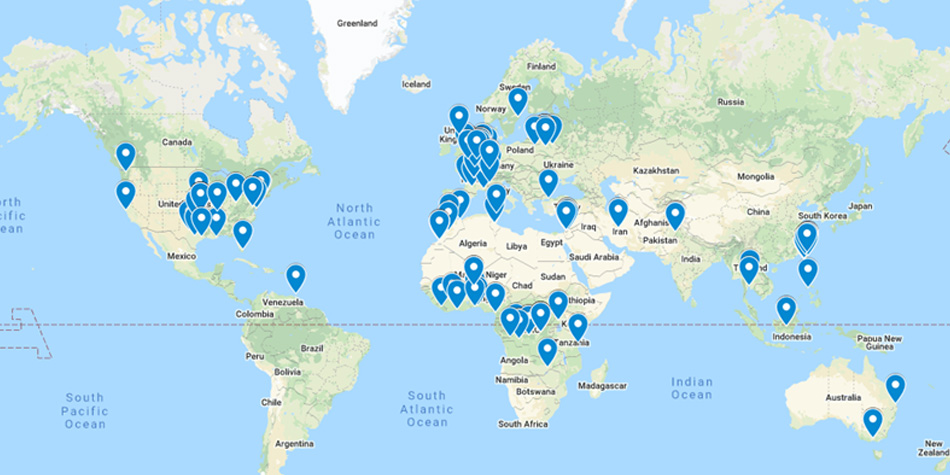
Article(s)
Take Action for World Day 2023!
By World coalition against the death penalty, on 20 September 2023
Take action now! The 21st World Day Against the Death Penalty is an excellent opportunity to publicly oppose the use of this inhumane punishment and to support those who are fighting for its abolition all over the world.
2023
Cruel, Inhuman and Degrading Treatment and Punishment

Article(s)
European Protocol for full abolition turns 20
By World Coalition Against the Death Penalty, on 3 May 2022
Today is the 20th anniversary of the adoption of Protocol No. 13 to the Convention for the Protection of Human Rights and Fundamental Freedoms, concerning the abolition of the death penalty in all circumstances.
2022
Armenia
Azerbaijan
Member(s)
Centre d’Observation des Droits de l’Homme et d’Assistance Sociale (CODHAS)
on 30 April 2020
CODHAS aims to: – Contribute to the defense and promotion of human rights in the province of North Kivu; – Contribute to the promotion of peace and reconciliation; – Contribute to the promotion of gender Art6. Achieving these aims, in particular through the following strategies: – Organization of activities for the extension of Congolese law […]
2020
Democratic Republic of the Congo
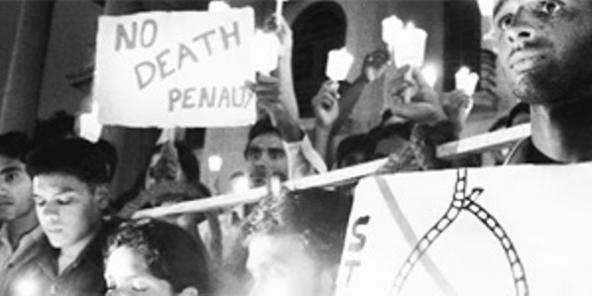
Article(s)
India should join nations abolishing the death penalty
By Navkiran Singh, Lawyers For Human Rights International, on 27 September 2012
The debate has recently been growing in India, with former President Pratibha Patil commuting the death sentence of 35 convicts in a few years and 14 former judges challenging death penalties confirmed by the Supreme Court.
Although India has not executed anyone since 2004, more than 400 people are on death row and the courts hand down fresh death sentences every year. Navkiran Singh, general secretary of World Coalition member organisation, Lawyers For Human Rights International, explains why he believes there is a positive move in his country.
2012
India
Article(s)
Talk: activists at the heart of action
on 12 February 2008
Italy’s Angeli Flegri association is organising a conference on Februay 22 about the role of prison activists in the struggle against the death penalty.
2008
Italy
United States
Article(s)
Nie Shubin: a victim of the arbitrary in China
on 21 January 2008
In the lead up to the Beijing Olympics, the French coalition Collectif Chine JO 2008 highlights cases of human rights abuse in China on a weekly basis. This week, they focus on Nie Shubin, who was executed by mistake in 1995.
2008
China
Cruel, Inhuman and Degrading Treatment and Punishment
Women

Article(s)
Abolition of the death penalty in Guinea
By Marion Gauer, on 5 July 2016
Guinean Parliament put an end to Guinea’s de facto moratorium by abolishing the death penalty in law in this country.
2016
Guinea
Public Opinion
Document(s)
Public Opinion and the Death Penalty Guide
By The Death Penalty Project, on 1 November 2022
2022
NGO report
Public Opinion
More details See the document
When faced with calls to join the majority of states worldwide that have now abolished capital punishment, a key justification, typically relied upon by retentionist states, is that their citizens are not yet ready for abolition, and that political leaders must represent ‘the will of the people.’ The Death Penalty Project produced this resource on public opinion and the death penalty.
- Document type NGO report
- Themes list Public Opinion
Document(s)
Report of the Secretary General: Question of the death penalty 2024
By Office of the High Commissioner for Human Rights (OHCHR), on 16 July 2024
2024
United Nations report
Clemency
Death Row Conditions
Fair Trial
Trend Towards Abolition
aresfrruzh-hantMore details Download [ pdf - 424 Ko ]
Pursuant to Human Rights Council decision 18/117, the present report is submitted to update previous reports on the question of the death penalty. In the report, the SecretaryGeneral reaffirms the general trend towards universal abolition of the death penalty and highlights initiatives limiting its use and implementing safeguards guaranteeing the protection of the rights of those facing this penalty. Between July 2022 and June 2024, a minority of States continued to implement the death penalty, with some increasing their use considerably. Pursuant to Council resolution 22/11, the report includes information on the human rights of children of parents sentenced to the death penalty or executed.
- Document type United Nations report
- Themes list Clemency / Death Row Conditions / Fair Trial / Trend Towards Abolition
- Available languages مادعلإا ةبوقع ةلأسم - ماعلا نيملأا ريرقتLa cuestión de la pena de muerte Informe del Secretario GeneralQuestion de la peine de mort - Rapport du Secrétaire généralВопрос о смертной казни - Доклад Генерального секретаря死刑问题 秘书长的报告
Document(s)
Texas Death Penalty Developments in 2022: The Year in Review
By Texas Coalition to Abolish the Death Penalty, on 16 December 2022
2022
NGO report
United States
More details See the document
Use of the death penalty in Texas remained near historic low levels in 2022, with juries sentencing two people to death and the State executing five people. Three other scheduled executions were stayed by the Texas Court of Criminal Appeals (CCA). Overall, the eight execution dates set for 2022 were the fewest in Texas since 1996.
Despite their low number, the executions set and carried out in 2022 raise troubling issues about the fairness and utility of the death penalty. Four of the men put to death, including 78-year-old Carl Wayne Buntion, suffered from physical or mental impairments or histories of childhood trauma, while two maintained their innocence of the crimes for which they were convicted.
- Document type NGO report
- Countries list United States
Document(s)
Wrongful Convictions and the Death Penalty Guide
By The Death Penalty Project, on 1 November 2022
2022
NGO report
Fair Trial
More details See the document
One of the most compelling forces behind the evolution of international attitudes towards capital punishment in recent decades has been the increasing recognition of the potential for error in its use – that those states that choose to retain the practice may be taking the lives of innocent individuals. The Death Penalty Project produced this resource on wrongful convictions and the death penalty.
- Document type NGO report
- Themes list Fair Trial
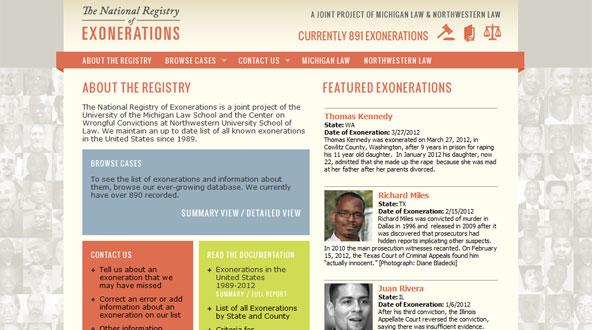
Article(s)
One in nine exonerations in new database is a capital case
By World Coalition, on 26 May 2012
A new online project listing 891 exonerated wrongful convictions in the US includes 101 death sentences.
2012
Innocence
United States

Member(s)
Kenyan Section of the International Commission of Jurists (ICJ-KENYA)
on 30 April 2020
Mandate and goals : – To develop, strengthen and protect the principles of the rule of law in Kenya. – Develop, maintain and protect the independence of the judiciary and the legal profession in Kenya. – Protect and promote the enjoyment of human rights in Kenya and Africa. Kind of actions : – Legal research […]
2020
Kenya

